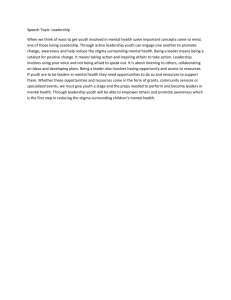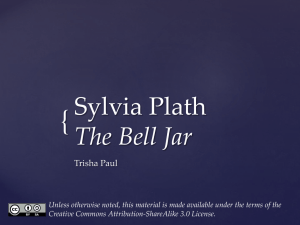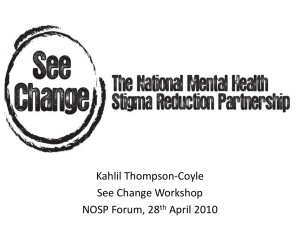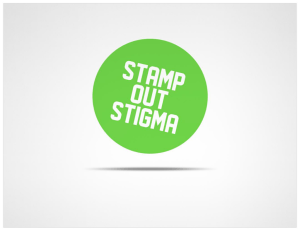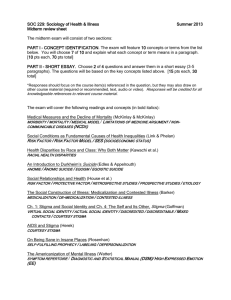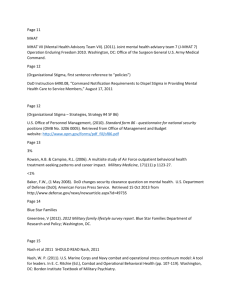Sticks and Stones May Break Bones, But Words Can Really Hurt!
advertisement
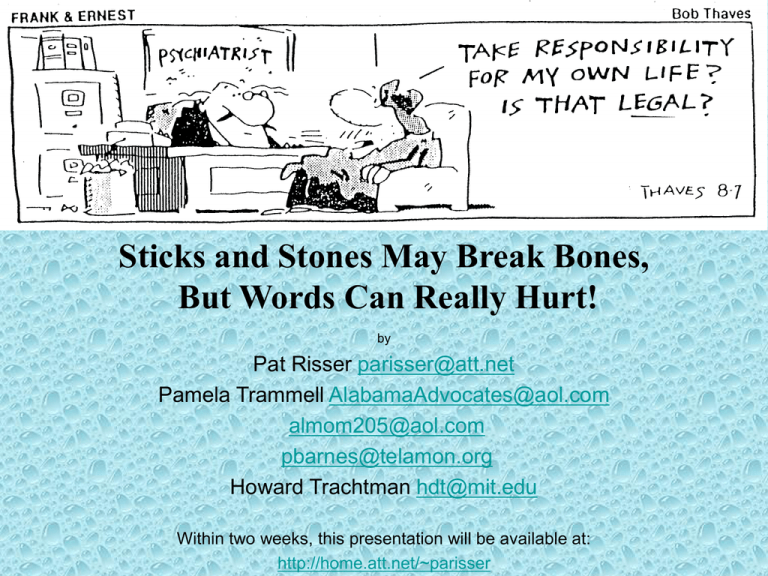
Sticks and Stones May Break Bones, But Words Can Really Hurt! by Pat Risser parisser@att.net Pamela Trammell AlabamaAdvocates@aol.com almom205@aol.com pbarnes@telamon.org Howard Trachtman hdt@mit.edu Within two weeks, this presentation will be available at: http://home.att.net/~parisser Opening Joke The psychology instructor had just finished a lecture on mental health and was giving an oral test. Speaking specifically about manic depression, she asked, "How would you diagnose a patient who walks back and forth screaming at the top of his lungs one minute, then sits in a chair weeping uncontrollably the next?" A young man in the rear raised his hand and answered, "A basketball coach?" Systemic Problems "Adults with serious mental illness treated in public systems die about 25 years earlier than Americans overall, a gap that's widened since the early '90s when major mental disorders cut life spans by 10 to 15 years." Report from NASMHPD (National Association of State Mental Health Program Directors), May 7, 2007 The Danger of Apathy When they came for the communists, I remained silent; I was not a communist. When they locked up the social democrats, I remained silent; I was not a social democrat. When they came for the trade unionists, I did not speak out; I was not a trade unionist. When they came for the sick, the so-called incurables, I didn't speak up; I wasn't mentally ill. When they came for the Jews, I didn’t speak up; I wasn’t a Jew. When they came for the Catholics, I didn’t speak up; I was a Protestant. When they came for the writers and the thinkers and the radicals and the protesters; I turned away When they came for the gays, and the minorities, and the utopians, and the dancers; I turned away And when they came for me; I turned around and around, and there was nobody left... Based upon a poem by Pastor Martin Niemoller, 1892 - 1984, German Protestant Minister The Danger of Apathy In the mental death system, they first came for the consumers and I didn't speak up because I was a member of the ACT Team. Then they came for the survivors, and I didn't speak up because I was a Peer Counselor. Then they came for the ex-patients, and I didn't speak up because I was a Peer Companion. Then they came for the elderly, and I didn't speak up because I was young. Then they came for me -- and by that time no one was left to speak up. Kevin Childs - 1998 FEAR OF OTHERS IN AN ANXIOUS AGE "Could we up the dosage? I still have feelings." Mentalism Mentalism = Discrimination (aka Sane-ism) Similar "ism's" are: Racism Sexism Ageism Micro-Aggressions Discrimination can be blatant but more often consists of: Micro-aggressions* 1. Not powerful individually 2. hundreds, even thousands daily 3. cumulative effect over years * Dr. Chester Pierce, an African-American psychiatrist and author writing about racism in the book, "The Black 70’s", termed the multiple small insults and indignities directed at people "micro-aggressions." Power Dynamics • US versus THEM • Power-up group Power-down group “Normal” Sick Healthy Disabled Reliable Crazy Capable Unpredictable/Violent Power Dynamics • Behaviors of the power-down group are framed in pathological terms. • The same behaviors are excused or even valued in members of the power-up group. "Decompensating" is an us-them term Under stress "we" may not do well; "we" may cocoon, take to bed, get bummed out, get burned out, get a short fuse, throw plates, scream, call in sick, or need a leave of absence. "They" decompensate. Stereotypes Because prejudicial stereotypes portray people having psychiatric concerns as violent and unpredictable, treatment has largely become synonymous with social control. As a result, many mental health clinicians tend to equate subduing the person with treatment; a quiet client who causes no community disturbance is deemed "improved" no matter how miserable or incapacitated that person may feel as a result of the treatment. "They" may be miserable but that's not the point. "Their" misery doesn't matter. The only thing that matters is any inconvenience "they" may cause "us." We versus They Labeling, diagnosis and other practices tend to decontextualize people. Typically, when treatments are ineffective or unacceptable, the recipient is blamed. He or she is: • "treatment-resistant," • "uncooperative," • "non-compliant," • "characterologic" and, has therefore failed the provider rather than the other way around. Losing Status as a Person The demotion from "us" to "them" is a loss of one's designation as a person. A person with a diagnosis can become: • "a schizophrenic" or • "a bipolar" or • "a borderline," or • CMI, SMI, SPMI, ADHD, etc. THE LANGUAGE OF US AND THEM We like things. They fixate on objects. We try to make friends. They display attention-seeking behaviors. We take a break. They display off-task behavior. We stand up for ourselves. They are non-compliant. We have hobbies. They self-stimulate. We choose our friends wisely. They display poor peer socialization. We persevere. They perseverate. We love people. They have dependencies on people. We go for walks. They run away. We insist. They tantrum. We change our minds. They are disoriented and have short attention spans. We are talented. They have splinter skills. We are human. They are.......? Beyond US versus THEM “Less Than” Our soldiers are trained to see the “enemy” as “less than” in order to appropriately do battle In our male dominated society, women are often treated as “less than” In our white dominated society, people of color are often treated as “less than” In our society, children are still often viewed as chattel (“less than”) In our materialistic society, the poor, the sick, the disabled, the homeless and others are often considered “less than” Beyond US versus THEM “Less Than” • Adults get locked up in psychiatric facilities because we are perceived as "less than." • Adults get placed in seclusion and restraints because we are perceived as "less than." • Adults get TASERed because we are perceived as "less than." • Instead of home ownership, adults are "placed" in group homes and community living because we are perceived as "less than." • Instead of business ownership, adults are "placed" in dead-end, low-level, jobs with no career advancement opportunities because we are perceived as "less than." • Adults who were abused, neglected and traumatized as children get labeled as "mentally ill" because we're perceived as "less than." • Adults learn hopelessness, helplessness and powerlessness because they've been perceived (and treated) as "less than." “Less Than” That "objective distance" of professionals keeps us as "less than." When we ignore pain and suffering, when we step over the bodies of the homeless, when we ignore the cries of another, we create an "us versus them" who are, "less than." We believe that our movement for human rights must keep it's focus on how we treat and are treated as "less than" by the system and society. Us versus Them “Less Than” Note that there are dynamics for both parties. It’s not just the oppressor who feels superior but we must consider the oppressed and how attitudes and actions impact on their lives. Trauma and Retrauma Often we are traumatized and retraumatized by the mental health system Ways this occurs are: The system incarcerates citizens who have committed crimes against neither persons nor property through the involuntary commitment process Imposes diagnostic labels on people; labels that are often pejorative, stigmatize and defame Induces proven neurological damage by force and coercion with powerful psychotropic drugs Stimulates violence and suicide with drugs promoted as able to control these activities Destroys brain cells and memories with an increasing use of electroshock (also known as electroconvulsive therapy) Employs bondage (restraints) and seclusion (solitary confinement) in preference to patience and understanding Humiliates individuals already damaged by traumatizing assaults to their self-esteem Teaches learned helplessness through the constant threat of the use of involuntary commitment, force and coercion Lacks sensitivity to issues of trauma including being unaware or unwilling to address potential "triggers" (Hospitals/offices may have personnel, equipment, smells, procedures, pictures, etc. that might be vivid reminders of past abuse suffered by patients) Mental health professionals often just don’t listen. They KNOW what's best for the person so they discount the person as being the best expert on their own life so they tune out or don't hear what the person is really saying. Outcome of Trauma and Retraumatization • • • • • • • • • • People internalize the negative attitudes People feel ashamed People blame themselves for their difficulties People feel worthless People feel hopeless about their future People lose confidence about their abilities People feel they must hide their histories People fear losing their job, their friends, their credibility People become demoralized People direct their anger and helplessness back upon themselves creating a worsening spiral downward 7 DIRTY WORDS ...we hear from our providers that hurt like sticks and stones 1. 2. 3. 4. 5. 6. 7. Compliance -- "Compliance" suggests conforming, acquiescing, or yielding in a subservient way. We're more likely to "adhere" to a co-authored wellness plan than we are to comply with a mandated treatment regimen. Patient Failed the Treatment -- Patients don't fail treatments. Treatments fail patients. The Bipolar -- Every time we're known as "the bipolar in room 3," or "the schizophrenic in the waiting room," we feel a little less human. Eventually, we may even introduce ourselves as our label as if it’s the most important part of our being. Treatment Team -- We love teams -- especially teams that are helping us become well. The problem is that we're very often not on the team. Sometimes we're not even on the playing field! Let us be the captain of our team, or consider yourself cut from the roster. Treatment Resistant -- Trust us; we are not resistant to treatment. We're all for it! Please don't blame the fact that the treatment doesn't work on us. Minimal Side-Effect Profile -- Weight gain, sleep interruption, and sexual dysfunction are not minimal side-effect profiles. These are issues at the very core of how we see ourselves. Please don't call these "minimal side-effects" minimal, because they're major life obstacles to us. Front Line Staff in the Trenches -- When did treating us become warfare? We'd like to partner with you to bring meaning to your life's work -- not be your enemy on a battlefield. COMPLIANCE Nowhere in medicine are physicians more preoccupied with enforcing "compliance" than psychiatry. Most non-psychiatric physicians have come to accept that compliance itself is a myth. Patients of no other set of medical issues are kept under such scrutiny by the public. Humans don't comply with anything (Studies of "compliance" with everything from diabetic diets to anti-hypertensive agents show that humans don't comply with anything. At least one third of people in these studies fail to follow their doctors' instructions and many studies have shown rates of "noncompliance" of over 50%.) Best results are obtained when people are well-informed and in control of their treatment Incarceration is used to contain the person who will not comply, though, because the incarceration occurs in a hospital, it is deemed to be "treatment” Cancer patients who refuse chemotherapy are not taken to the hospital by the police and forced to get treatment. People are not locked up for not participating in treatment or failure to comply. Imagine jailing a diabetic for having dessert or incarcerating a person having chronic bronchitis or asthma for lighting up a cigarette or forgetting his/her inhaler or someone on a diet eating fast food. More on Language Treatment: If they lock you up against your will, strip you literally and figuratively (of your rights) and force you into bondage and solitary confinement and then inject you with powerful and painful drugs, they call it "treatment." In every other possible realm on earth, this is torture and not "treatment." If they set a fifteen-minute appointment for you to renew your drugs every two weeks or month, they call that "treatment" and they can bill your insurance for payment. Even More on Language To be a mental patient is to participate in stupid groups that call themselves therapy -- music isn't music, it's therapy; volleyball isn't a sport, it's therapy; sewing is therapy; washing dishes is therapy. Even the air that we breathe is therapy – called milieu. (Rae Unzicker - "To Be a Mental Patient") Biology The system’s biological approach reduces human distress to a brain disease, and recovery to taking a pill. The focus on drugs obscures issues such as housing and income support, vocational training, rehabilitation, and empowerment, all of which play a role in recovery. Normal behaviors are NOT symptoms: Normal people can have a bad day, an "off" week and even a "down" month. However, if we exhibit those normal behaviors on the job, they get labeled and we are asked if we took our medications or if someone needs to call our shrink. Everything we do gets viewed through a lens of pathology. Side-Effect? There is no such thing as a "side-effect": There are only effects from taking drugs. Some effects are desired and others are undesirable. Calling something a "side-effect" obscures and minimizes the resultant pain, suffering and misery and in doing so, it discounts our experiences and perceptions and thus sets us up as less than we are. It denies our reality. There are no such things as side effects – only effects, some of which we call "side" in order to avoid discussing them. If a psychiatrist wants to trivialize your discomfort in an effort to urge you to be m ore compliant, he or she may refer to your discomfort as a mere "side-effect," as though it's not important. Perhaps it isn't important to them but they should acknowledge its importance to you. Triggers No, not that Trigger … Triggers • Because powerlessness is a core element of trauma, any treatment that does not support choice and self-determination will tend to trigger individuals having a history of abuse. • People may re-experience the helplessness, hopelessness, pain, despair, and rage that accompanied the trauma. • They also may experience intense self-loathing, shame, hopelessness, or guilt. • Mentalist thought tends to label these negative effects of treatment in pejorative terms that blame the survivor: "He's just acting out," "She's manipulating," "He's attention-seeking." • These labels are often communicated through the attitudes and language of staff, and become re-traumatizing in themselves. • Mentalism, like racism or sexism, is abuse. Triggers • There is a problem with the word "trigger." People use the word as if there is some particular precipitating cause that "triggers" us to go off like a discharging bullet. It's very stigmatizing to believe that we are so volatile. It's just as stigmatizing to not recognize that a "trigger" may be only the final straw in a series of mistreatments that have had a cumulative effect over hours, days, weeks, months or even years. The Loss of Self Becoming a Mental Patient The more I sank into the role of “mental patient,” the more I lost my self. I lost my self-esteem, self-admiration, self-confidence, self-glorification, self-love, self-regard, self-respect, selfsatisfaction, self-sufficiency, self-trust, self-worth, self-determination, self-exaltation, selfimportance, self-assurance, self-importance, selfinterest, self-possession, and self-pride. I lost hope as my identity became more and more just that of “mental patient” and my loss of self-pride resulted in a loss of self. RECOVERY “With each episode of standing up and questioning and challenging, I felt better and stronger. I felt better as I became more self-determining. I slowly began to regain my sense of self. I grew stronger in my self-esteem, selfadmiration, self-confidence, self-glorification, self-love, self-regard, selfrespect, self-satisfaction, self-sufficiency, self-trust, self-worth, selfdetermination, self-exaltation, self-importance, self-assurance, selfimportant, self-interested, self-possessed, and self-pride. I acquired a renewed balance in my roles in life. Instead of my life being dominated by my mental patient role, I became more of a husband and father. I got into the workforce and developed a strong sense of pride in my work and even in my ability to work; something that had been missing for many years. That sense of self-pride grew to impact more and more areas of my life and the sense of accomplishment was tremendous. “So, just as I had lost my “self” I worked hard to recover that lost “self” and pride was the key. In losing my “self” I lost my pride in who and what I am and I became “mental patient.” In recovering my “self” I rediscovered a sense of pride as I redeveloped into a self-determining adult.” Stigma Stigma has to be adopted by the person to be shamed. Stigma is consumer inaction in the face of oppression. It doesn't exist without the collusion of the target person. The whole stigma, anti-stigma issue is primarily about marketing mental health services, shifting responsibility for a system in shambles, from the system to the would be service user, who doesn't ask for help because of 'stigma.' Mental illness clients, just like the general public, have been convinced by "Big Pharma" marketing. We are the victims. Stigma is not 'our' behaviors; it is behavior of those who learn it in school, law enforcement, media, and the general public. The proper words are prejudice and discrimination. One is social, the other legal. They are legally actionable! Stigma is a stigmatizing word in itself, why have a different word for prejudice against mental health consumers than for prejudice against other groups? Stigma In its brochure "The Stigma of Mental Illness," the NIMH says: "Historical physical abuse or neglect have been replaced by a less visible but no less damaging psychic cruelty. ... We no longer send (people labeled mentally ill) to a far-away asylum. Instead, we isolate them socially, a much more artful though equally debilitating form of ostracism." Empowerment • • • • • • • • • • • • • • • • • 1. Having decision-making power. 2. Having access to information and resources. 3. Having a range of options from which to make choices (not just yes/no, either/or). 4. Assertiveness. 5. A feeling that the individual can make a difference (being hopeful). 6. Learning to think critically; unlearning the conditioning; seeing things differently; e.g., a) Learning to redefine who we are (speaking in our own voice). b) Learning to redefine what we can do. c) Learning to redefine our relationships to institutionalized power. 7. Learning about and expressing anger. 8. Not feeling alone; feeling part of a group. 9. Understanding that people have rights. 10. Effecting change in one’s life and one’s community. 11. Learning skills (e.g., communication) that the individual defines as important. 12. Changing others’ perceptions of one’s competency and capacity to act. 13. Coming out of the closet. 14. Growth and change that is never ending and self-initiated. • 15. Increasing one’s positive self-image and overcoming stigma. FREEDOM Each human being must free himself; freedom cannot be thrust or forced upon people if they are to be truly free. Force cannot be abolished by use of force. Freedom must be obtained by voluntary means, accomplished by reason and persuasion. Freedom is not free, unless we mean "freedom" as defined by Orwell and Kafka; "freedom" as granted by Stalin and Hitler; "freedom" to pace back and forth in your cage. Transforming Systems
